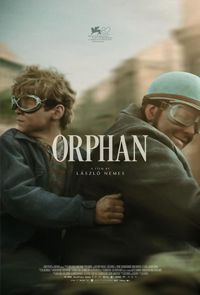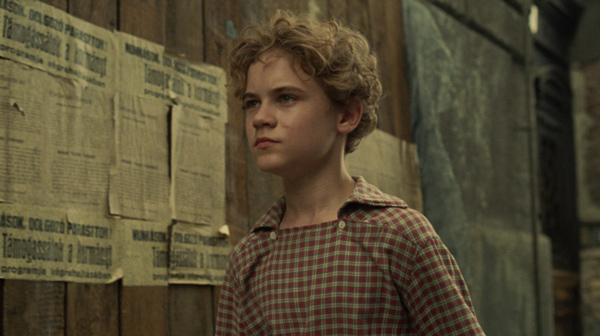I Will Be Your Father Figure: Nemes Paints Period Paternity Thriller
 Hungarian director László Nemes essentially rounds out a thematic trilogy with his third film Orphan (Árva), set in Hungary during the aftermath of WWII, where the healing wounds of the traumatized past have left behind jagged scars and puzzling new realities for the survivors. With Son of Saul (2015) taking place in the inferno of the concentration camp, and Sunset (2018) exploring similar themes from a world hurtling toward the oblivion of WWI, his latest is co-written with usual scribe Clara Royer, and is a slow burn identity thriller which builds to a majestic crescendo. Also returning is DP Mátyás Erdély, with a pronouncedly different look compared to his previous features with Nemes. Shot on 35mm, the film plays like a faded photograph blazing to life in muted, ochre yellows and drab hues, like a world still squinting to see through the detritus of destruction still settling down to rest. Except nothing is falling back to a point of origin.
Hungarian director László Nemes essentially rounds out a thematic trilogy with his third film Orphan (Árva), set in Hungary during the aftermath of WWII, where the healing wounds of the traumatized past have left behind jagged scars and puzzling new realities for the survivors. With Son of Saul (2015) taking place in the inferno of the concentration camp, and Sunset (2018) exploring similar themes from a world hurtling toward the oblivion of WWI, his latest is co-written with usual scribe Clara Royer, and is a slow burn identity thriller which builds to a majestic crescendo. Also returning is DP Mátyás Erdély, with a pronouncedly different look compared to his previous features with Nemes. Shot on 35mm, the film plays like a faded photograph blazing to life in muted, ochre yellows and drab hues, like a world still squinting to see through the detritus of destruction still settling down to rest. Except nothing is falling back to a point of origin.
In 1949, young Andor is retrieved from a state run orphanage by his mother Klara (Andrea Waskovics), a woman he barely remembers. His father, he’s told, was deported to a concentration camp. Eight years late, Andor (Bojtorján Barabas) patiently awaits the return of his father, though increasingly it appears this may never happen. Meanwhile, a recently stymied uprising against communism, brutally quashed by the Soviet regime, has Budapest on edge. The relative of a family friend was able to flee the failed rebellion, but being badly wounded, he remains in hiding. Klara declines to participate in assisting his mother in moving the wounded rebel as he awaits transport to America. But life changes drastically when Berend (Grégory Gadebois) suddenly reunites with Klara unexpectedly, and it’s revealed not only was he responsible for hiding Klara during the war, he’s also Andor’s biological father, and has every intention of assuming this role. Physically domineering and prone to physical abuse, Berend, a butcher by trade who refuses to take ‘no’ for an answer, is hardly the father figure Andor envisioned. Refusing to accept this reality, the horror of his mother’s tactics for survival leads young Andor to make an executive decision.

In a significant history of war related identity thrillers, Orphan touches upon the film noir handbook of something like The House of Telegraph Hill (1951), fusing real-world chaos with sumptuous identity politics in a compelling ethical dilemma of survival strategies. More recent forays, such as Christian Petzold’s Phoenix (2014), itself a loose remake of an earlier J. Lee Thompson film, or glossy fodder like The Good Liar (2019), similarly return to these stolen identity narratives, but Nemes tells his story from the perspective of an overtly determined child. Like The Bad Seed (1956) meets The Fallen Idol (1948), Nemes creates a concoction that plays like the nightmare version of Claude Berri’s The Two of Us (1967), wherein the relationship between a gruff, grubby adult male and a precocious child creates the dramatic catalyst. The identity politics are also reminiscent of Hitchcock, for there is an ambiguity of paternalism which is never fully satisfied. The belief, or perhaps the recognition, of the role of biological fatherhood, can only really be confirmed by Klara, who clearly is operating in survival mode and will say whatever makes sense to make her current situation work.
In the background of Orphan is Klara’s distressing narrative, and it’s her obscured perspective which haunts the film. A mournful Andrea Waskovics, whose screen presence is reminiscent of Hanna Schygulla, recalls Agnieszka Holland’s Angry Harvest (1985), in which Elisabeth Trissenaar, a Jewish woman, must offer her body to Armin Mueller-Stahl, who has agreed to hide her on his property. Likewise, the political realities of post-WWII Hungary in the late 1950s have cemented an environment of terror in the Soviet Union’s quest to thwart anti-communist uprisings. This layer, which involves a pistol exchanging hands at an integral moment, will likely haunt Andor for the remainder of his days.
Rife with disturbing symbolism, Orphan does take painstaking time to take flight, and the build up sometimes feels like it’s spinning its wheels over obvious territory. Grégory Gadebois is perfectly cast as the corpulent butcher who has come to lay stake to his claim on Klara…though there is the nagging reality of his previous wife and special needs child who are so conveniently out of the picture. Nemes’ real find is the cherubic Bojtorján Barabas, who disturbingly has made a habit of speaking to his imaginary father figure through the boiler, a man who was likely gassed in the camps. Barabas is the beating heart of the film, a child wise beyond his years and committed to keeping the memory of his deceased father alive, which, tragically, might be a complete fabrication. A finale on a Ferris wheel with a five-pointed star in its spokes blazes across a sky forever defined by terror and xenophobia. Ironically, Andor is actually not an orphan, though he was considered one for a period. Perhaps we’re in the same place collectively, as humankind.
Reviewed on August 28 at the 2025 Venice Film Festival (82nd edition) – In Competition. 132 Mins.
★★★½/☆☆☆☆☆


